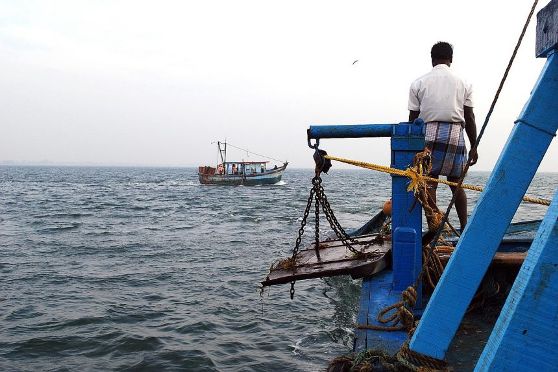Deaths reveal marine crisis in India-Sri Lanka waters
Recurring diplomatic tussles overshadow grave threat to environment from overfishing
By Rohini Mohan
BANGALORE – The recent deaths of four fishermen from Tamil Nadu – one of them a Sri Lankan Tamil refugee living in India – have revealed a marine crisis that has been masquerading as a diplomatic issue for years.
The four men set out to fish at sea from Kottaipattinam in Pudukkottai district on Jan 18.
Their trawler allegedly collided with a Sri Lankan Navy vessel and sank in Sri Lankan waters, about eight nautical miles inside the International Maritime Boundary north-west of Delft Island.
The spot often serves as a marker of where Sri Lankan waters begin.
The men are the latest of dozens of Tamil fishermen killed by the Sri Lankan Navy for crossing the Palk
Strait beyond the maritime boundary between the two countries. The navy has also detained thousands over the past decade.
India said it has lodged a “strong protest” with Sri Lanka over the deaths of its fishermen.
The Indian Ministry of External Affairs said on Jan 21: “Expressing our deep anguish at the loss of lives, we emphasized the need to deal with issues pertaining to fishermen in a humanitarian manner. Existing understandings between the two governments in that regard must be strictly observed.”
Sri Lanka’s Foreign Ministry Secretary Jayanath Colombage told a local TV channel: “The incident happened within our waters when the boat collided with a Sri Lankan naval patrol craft (during patrolling).”
He added that the boat sank while the fishermen resisted arrest.
The incessant diplomatic tussle between the two nations belies the true cause of such deaths and obscures a grave environmental catastrophe.
At the narrowest part of the Palk Strait, Indian and Sri Lankan waters are a mere 15 nautical miles apart. Many mechanized boats from Tamil Nadu regularly cross the strait to enter Sri Lankan waters in search of a better catch.
This is because in the Sri Lankan north, the seas are richer thanks to the country’s ban on trawling and the three decades of civil war that saw little fishing activity in these waters.
Off the southern coast of India, however, marine catch has plummeted due to overfishing, with trawlers – mechanized boats – dragging nets along the seabed. Government policies continue to promote trawling over more sustainable methods, exacerbating the situation.
While fishing across the maritime boundary of the two countries is an old practice, tussles at sea have proliferated since the Sri Lankan civil war ended in 2009.
- Justin, a fisherman on another boat casting its nets near where the four men lost their lives, admitted that the Indian boat was at least 2.7 nautical miles within Sri Lanka’s waters.
“We can’t help it, we only get fish there,” he said.
Many fishermen in Pudukkottai and Ramanathapuram – the Tamil Nadu districts closest to Sri
Lanka’s northern tip – show bullet wounds and speak of surviving Sri Lankan Navy attacks. Dozens of families have lost men to this recurrent derring-do.
“It is a matter of livelihood, which is why the fishermen take such risks,” said U. Arulanandam, founder of the Alliance for the Release of Innocent Fishermen in Pudukkottai, a group formed in the 1990s to convince the Sri Lankan navy to free detained Indian fishermen.
Every time a fisherman dies, the issue escalates. In 2017, when a Rameshwaram fisherman died of a bullet injury in the Palk Strait, Tamil Nadu fishermen alleged he was shot by the Sri Lankan Navy, which denied the charge.
Last month, a joint working group with representatives from both countries agreed only to arrest violators.
Sri Lanka suggested having joint patrols to end poaching while India insisted on the release of Indian fishermen who were recently arrested.
On Jan 19, Sri Lanka released 40 Indian fishermen but kept their boats and equipment.
The joint patrols have not been formed.
On Tuesday (26), the Sri Lankan fisheries ministry appointed a three-member committee to make recommendations on “measures to stop poaching by Indian fishermen” in the country’s waters.
“Diplomats hold meeting after futile meeting, fishermen are caught and released again. But until there are permanent measures like helping Indian fishermen move out of trawling in India, the crisis will continue,” said Indian marine expert V. Vivekanandan.
-Rohini Mohan India correspondent in Bangalore for The Straits Times where this article was originally featured


